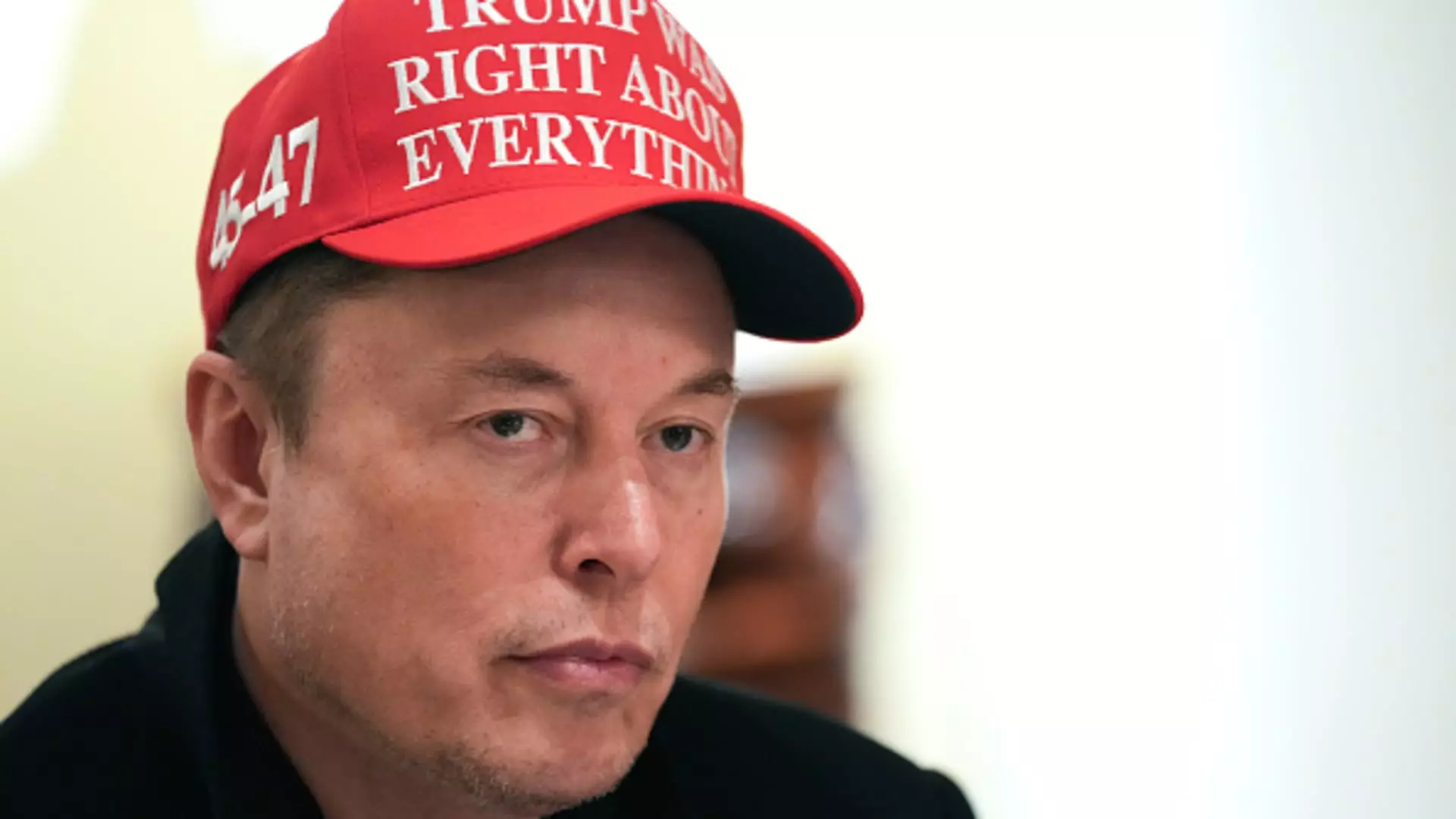Tesla Inc., the vanguard of electric vehicles, is experiencing a troubling downturn that has analysts and investors jittery. The company’s shares plummeted nearly 6% ahead of its latest earnings report, languishing at a mere $227.50—only a hair’s breadth above its annual low while sitting at a staggering 44% drop for the year. This is no mere market aberration; it signifies a fundamental brand erosion that can no longer be ignored. In the volatile arena of tech stocks, volatility is expected, but repeated declines mark a disconcerting trend. For the twelfth time this year alone, Tesla’s stock has dropped 5% in a single trading day, raising alarm bells and tough questions about its sustainability moving forward.
Elon Musk: A Double-Edged Sword
At the heart of this turmoil lies Elon Musk himself, whose divergent interests and polarizing political activities have created a perfect storm for Tesla’s brand image. While Musk has often been viewed as a visionary, his escalating focus on politically charged endeavors, particularly his ties to Donald Trump, have prompted serious backlash. Musk’s involvement with the Trump administration—and his recent initiatives to reduce federal employment—has nursed a growing crop of dissent within the consumer base. Critics suggest that Musk’s political affiliations have not only diverted his focus from Tesla but also transformed the brand into a controversial symbol of the Trump-era politics—a transformation that could be costing Tesla dearly in the marketplace.
An investor’s inquiry highlights this concern poignantly: “What steps has the board of directors taken to mitigate the brand damage caused by Elon’s political activities?” With such poignancy in questions being raised, it’s hard to overlook how Tesla’s fortunes are closely tied to the personal pursuits of its CEO, effectively raising the stakes for the company in the eyes of potential and current investors.
The Self-Driving Dilemma and Robotaxi Hurdles
On top of Musk’s political drama, there exists an ominous cloud hanging over Tesla’s much-anticipated technological innovations. The company’s long-delayed robotaxi and autonomous driving technologies are still in limbo, leaving investors anxious. Over 300 questions were posed in Tesla’s investor forum about its self-driving systems alone—a glaring indication of how critical these technologies are to the company’s future growth. Concerns about the efficacy and safety of these innovations are beginning to weigh heavily on brand confidence.
Sadly, the anticipated revenues and deliverables for the first quarter appear uninspiring; analysts predict a meager $21.24 billion and a potential registration of only 336,681 vehicles—a concerning mark as it represents a 13% decline from the previous year. The pressure mounts not just from technological home fronts but also from regulatory scrutiny surrounding Musk’s grandiose promises of full self-driving capabilities.
The Repercussions of International Market Shifts
Adding to this tempest are the geopolitical headwinds that Tesla faces globally, particularly in China. Oppenheimer analysts have identified that brand erosion in the U.S. and Europe may pale in comparison to the actual threats posed by potential weaknesses in the Chinese market. As the demand for electric vehicles ramps up in China, nationalistic consumer trends might drive sales towards domestic manufacturers, leaving Tesla scrambling for export capacity. Should these dynamics unfold, the necessary downward price adjustments would represent an exhausting financial strain, necessitating a drastic reevaluation of profit margins.
With a consumer sentiment study revealing that a mere 27% of U.S. respondents would consider purchasing a Tesla—a drastic decline from 46% just last year—the concern cannot be understated. The perception of Tesla as an elite brand, once characterized by innovation and groundbreaking technology, is taking a tangible hit as these market conditions progress.
Investor Sentiment and The Road Ahead
Investor sentiment regarding Tesla is particularly precarious. With significant predictions of “permanent demand destruction” stemming from Elon Musk’s entanglement with politics, it raises questions about the long-term viability of the brand. Analyst Dan Ives articulated a sense of urgency for Musk to articulate a “turnaround vision” during the earnings call, hoping to reinstate faith in the brand before potential investors opt for more stable alternatives. Yet, what Musk needs to acknowledge is that turning back the clock may involve not just a vision but a genuine departure from the politically-charged narrative that surrounds him.
With downgraded price targets echoing the “confusion” permeating Tesla’s current state, the spotlight is unmistakably on Elon Musk. For all his innovations, his distractions may very well serve as a double sword, prompting urgent calls for change—not to the automation industry but to his approach and priorities. The stakes have never been higher, yet the future of Tesla appears as uncertain as ever.

